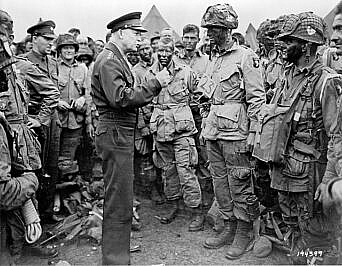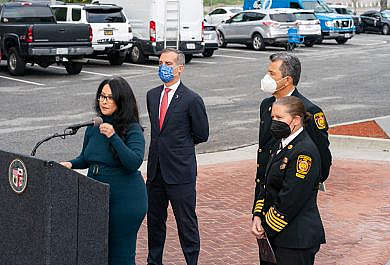The Fourth of July is the perfect time to reflect on the men and women who made our country great. Happy Independence Day!
1) George Washington’s Address to Congress Resigning His Commission (December 23, 1783).
George Washington resigned his commission as commander in chief of the Continental Army and returned to his farm as a private citizen. Washington’s voluntary surrender of power helped immortalize him as the “American Cincinnatus.” King George III reportedly said, “If [Washington] does that, he will be the greatest man in the world.” This act was the foundation of the American Republic and led to Washington’s election as president five and a half years later.
“Having now finished the work assigned to me, I retire from the great theatre of Action; and bidding an Affectionate farewell to this August body under whose orders I have so long acted, I here offer my Commission, and take my leave of all the employments of public life.”
2) Frederick Douglass’ “What to the Slave is the Fourth of July?” (July 5, 1852).
Frederick Douglass, the great abolitionist born into slavery, delivered this excoriating address to an anti-slavery society in the years before the Civil War. Rather than argue the principles of the Founding be abandoned, Douglass used the values espoused in the Declaration of Independence and the Constitution to condemn the hypocrisy of a nation proclaiming freedom while enslaving millions. He urged America to live up to its highest ideals and ensure equality under the law for all, slave and free.
“Allow me to say, in conclusion, notwithstanding the dark picture I have this day presented of the state of the nation, I do not despair of this country. There are forces in operation, which must inevitably work the downfall of slavery. “The arm of the Lord is not shortened,” and the doom of slavery is certain. I, therefore, leave off where I began, with hope. While drawing encouragement from the Declaration of Independence, the great principles it contains, and the genius of American Institutions, my spirit is also cheered by the obvious tendencies of the age.”
3) Abraham Lincoln’s Gettysburg Address (November 19, 1863).
Abraham Lincoln delivered a brief address at the dedication of the Gettysburg Civil War Cemetery five months after the titanic battle that changed the course of the American Civil War. Lincoln spoke for two minutes, remarking, “The world will little note, nor long remember what we say here.” How wrong he was.
“That from these honored dead we take increased devotion to that cause for which they gave the last full measure of devotion – that we here highly resolve that these dead shall not have died in vain – that this nation, under God, shall have a new birth of freedom – and that government of the people, by the people, for the people, shall not perish from the earth.
4) Abraham Lincoln’s Second Inaugural Address (March 4, 1865).
Lincoln delivered his second inaugural just 41 days before his assassination. His appeal to Americans on both sides – who “read the same Bible and pray to the same God” gives us a glimpse to Lincoln’s vision of a merciful Reconstruction that never came to pass.
“With malice toward none with charity for all with firmness in the right as God gives us to see the right let us strive on to finish the work we are in to bind up the nation’s wounds, to care for him who shall have borne the battle and for his widow and his orphan – to do all which may achieve and cherish a just and lasting peace among ourselves and with all nations.
5) Calvin Coolidge’s Speech on the 150th Anniversary of the Declaration of Independence (July 4, 1926)
President Calvin Coolidge, the only president born on the Fourth of July, delivered a powerful address defending the revolutionary Declaration. Coolidge, a Republican, condemned self-described “progressives” who thought the Declaration was outdated and defended the “eternal truth” of the nation’s founding principles.
“It is often asserted that the world has made a great deal of progress since 1776, that we have had new thoughts and new experiences which have given us a great advance over the people of that day, and that we may therefore very well discard their conclusions for something more modern. But that reasoning can not be applied to this great charter. If all men are created equal, that is final. If they are endowed with inalienable rights, that is final. If governments derive their just powers from the consent of the governed, that is final. No advance, no progress can be made beyond these propositions. If anyone wishes to deny their truth or their soundness, the only direction in which he can proceed historically is not forward, but backward toward the time when there was no equality, no rights of the individual, no rule of the people. Those who wish to proceed in that direction can not lay claim to progress. They are reactionary.”
6) Franklin D. Roosevelt’s “Four Freedoms” speech (January 6, 1941)
President Franklin D. Roosevelt delivered his 1941 State of the Union months after becoming the first president elected to a third term, and 11 months before the Japanese attack on Pearl Harbor brought America into the Second World War. Roosevelt used his State of the Union to make the case for American involvement in the global conflict and laid out the eventual war aims of the Allied Powers.
“In the future days, which we seek to make secure, we look forward to a world founded upon four essential human freedoms. The first is freedom of speech, and expression—everywhere in the world. The second is freedom of every person to worship God in his own way—everywhere in the world. The third is freedom from want—which, translated into world terms, means economic understandings which will secure to every nation a healthy peacetime life for its inhabitants—everywhere in the world. The fourth is freedom from fear—which, translated into world terms, means a world-wide reduction of armaments to such a point and in such a thorough fashion that no nation will be in a position to commit an act of physical aggression against any neighbor—anywhere in the world. That is no vision of a distant millennium. It is a definite basis for a kind of world attainable in our own time and generation. That kind of world is the very antithesis of the so-called new order of tyranny which the dictators seek to create with the crash of a bomb.”
7) Dwight D. Eisenhower’s Order of the Day (June 6, 1944)
General Eisenhower delivered this speech to the Allied Expeditionary Force before the D-Day Invasion of Normandy that spelled the death knell of Nazi domination of Europe.
“You are about to embark upon the Great Crusade, toward which we have striven these many months. The eyes of the world are upon you. The hopes and prayers of liberty-loving people everywhere march with you. In company with our brave Allies and brothers-in-arms on other Fronts you will bring about the destruction of the German war machine, the elimination of Nazi tyranny over oppressed peoples of Europe, and security for ourselves in a free world.”
8) Margaret Chase Smith’s Declaration of Conscience (June 1, 1950)
Senator Margaret Chase Smith of Maine was the first woman to serve in both houses of Congress, and the first woman to run for the Republican nomination for President. Sen. Smith spoke four months after Sen. Joe McCarthy (R-WI) alleged there were 205 communists in the State Department, kicking off a national political firestorm. Sen. Smith criticized her colleague for his tactics and defended “the basic principles of Americanism”: “the right to criticize, the right to hold unpopular beliefs, the right to protest and the right of independent thought.”
“It is high time that we stopped thinking politically as Republicans and Democrats about elections and started thinking patriotically as Americans about national security based on individual freedom. It is high time that we all stopped being tools and victims of totalitarian techniques — techniques that, if continued here unchecked, will surely end what we have come to cherish as the American way of life.”
9) Martin Luther King Jr.’s “I Have a Dream” Speech (August 28, 1963)
The Rev. Martin Luther King Jr. delivered one of the most famous speeches of the 20th Century at the March on Washington for Jobs and Freedom on the steps of the Lincoln Memorial. King urged the federal government to take action to address civil rights and racial equality. King’s campaign for racial equality culminated in the Civil Rights Act of 1964 and the Voting Rights Act of 1965.
“So even though we face the difficulties of today and tomorrow, I still have a dream. It is a dream deeply rooted in the American dream. I have a dream that one day this nation will rise up and live out the true meaning of its creed: We hold these truths to be self-evident, that all men are created equal.”
10) Ronald Reagan’s “The Boys of Pointe du Hoc” Speech (June 6, 1984).
President Ronald Reagan delivered an address on the 40th anniversary of the D-Day landings that historian Douglas Brinkley called “one of the most inspirational presidential speeches ever written.” Sitting directly in front of Reagan were 62 “boys” who scaled the cliffs and liberated a continent. Today, they are almost all gone.
“Behind me is a memorial that symbolizes the Ranger daggers that were thrust into the top of these cliffs. And before me are the men who put them there. These are the boys of Pointe du Hoc. These are the men who took the cliffs. These are the champions who helped free a continent. These are the heroes who helped end a war.”
© Dominic Moore, 2022






